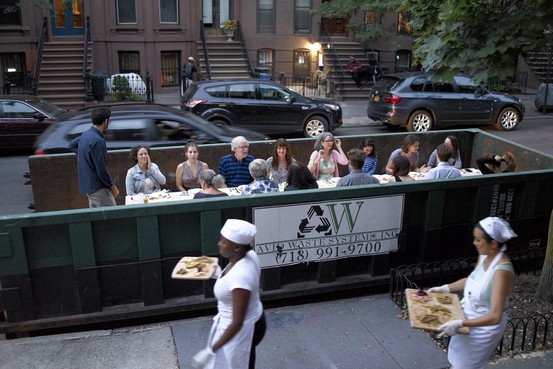Bruised apples, floppy herbs and moldy grapes might not be considered acceptable ingredients for most home cooks. But a Manhattan man is hoping to change New Yorker’s outlook on food freshness—one dinner party at a time.
Josh Treuhaft, a recent graduate of the design for social innovation master’s program at the School of Visual Arts, has hosted seven Salvage Supperclubs, where he served past-prime food to diners inside a scrubbed down dumpster.
In all, the dinner rescued 1.8 pounds of food per person that was otherwise destined for the landfill. Culled from farms, farmers markets, restaurants and home kitchens, the waste was still perfectly safe and nutritious, Mr. Treuhaft said—the chef just needed to be creative in its handling.
“People don’t like waste. It’s icky,” said Mr. Treuhaft, whose thesis originally focused on composting and remaking waste but then evolved to become the intersection of food and waste. “When you talk about food, people’s faces light up.”
A group of 16 adventurous foodies stepped into the dumpster, donated by a waste management company, along St. Marks Avenue in Brooklyn Thursday and seated themselves alongside fresh planks of lumber from Home Depot.
Mr. Treuhaft said that he preferred to make his tables from decommissioned scaffolding, but his source, Build It Green, didn’t have any this week.
Attendees paid $50 for the six-course meal, with profits going to City Harvest, an organization that rescues food and gives it to those in need.
The diners agreed that the food was good, if a bit light. Tiny beets from Queens County Farm, too small and time-consuming for farmers to pull from the ground, arrived to the table with their curly tail still intact.
The eggplant purée should have been white but was more of an ocher color, chef Celia Lam explained, because the Brooklyn restaurant that donated them had already cut them and they were beginning to brown.
Other dishes included watermelon rind pickles, beet green spanakopita, heirloom tomato soup shooters, and peach-peppermint sorbet, all made from food that had been cast off.
Monica Snellings, a former classmate of Mr. Treuhaft’s, was a second-time dinner guest and recounted learning at the last dinner to throw her vegetable scraps into a resealable bag in the freezer for use in future stocks. “I haven’t bought stock in a million years,” she joked.
Jessie Kipp, a videographer, confessed to not being much of a cook. This was his second dinner, which for him had become “more about extending the life of something.”
The dumpster itself was so eye-catching that Treuhaft spent much of the dinner chatting with strangers who stopped to observe the scene. Some snapped photos. Children stopped too, asking the obvious question: “Are you eating in a dumpster?”
The Salvage Supper club grew out of Mr. Treuhaft’s work at SVA, starting March 2014 as a thrown-together meal at school and then in a friend’s apartment.
The scavenged ingredients came after Mr. Treuhaft sent an email to classmates urging them to bring anything that was going bad in their fridge. The dinners drew raves, and he decided to bring on a professional chef.
Mr. Treuhaft found Ms. Lam when he marched into the Natural Gourmet Institute, a holistic culinary school in Chelsea. He described what he was doing—glossing over the bit about his guests sitting in a dumpster—and the school emailed the student body with his request.
Ms. Lam, equally passionate about using food “root to stalk,” was the first person to respond.
In addition to teaching New Yorkers about the possibilities of past prime food, Mr. Treuhaft wants to educate them about hunger. In 2010, the U.S. Department of Agriculture reported 31% of the nation’s food supply was wasted.
There will be more Salvage Supperclub’s in the future, but Mr. Treuhaft envisions a website and corresponding smartphone app that will allow users to upload photos of spoiled food and ask for help from an expert, or to share recipes and meet like-minded individuals.
His dream is for people across the country to get instructions on how to host their own Salvage Supperclub, meaning more rescued food and less in the waste stream.
Like all good innovators, he already has a name for his venture: Eat Everything.
Source: The Wall Street Journal










